A Unique Antique Kimono and Tea Ceremony Experience in English
In a convenient, accessible location, a unique cultural experience combines traditional antique kimonos and tea ceremonies in an intimate English-language encounter. Guests select and wear traditional kimonos, learning about the art of wearing them from knowledgeable hosts. The warm and welcoming atmosphere is enhanced by the hosts’ hospitality, as they explain the significance behind the tea ceremony. With a maximum of six travelers per tour, this stroller-friendly experience allows families to participate. With overwhelmingly positive reviews, this experience offers a truly immersive and unforgettable encounter. As you explore this unique experience, discover the beauty and elegance of Japan’s traditional fashion.
Just The Basics
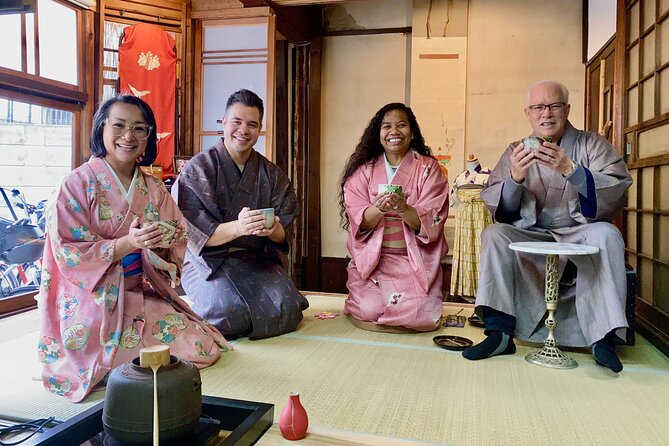
• Experience a traditional Japanese tea ceremony in English, accompanied by a unique antique kimono dressing experience.
• Enjoy a warm and welcoming atmosphere, created by knowledgeable hosts who provide insights into Japanese culture.
• Select and dress in traditional kimonos, with guidance on proper wearing techniques, and discover the elegance of Japan’s traditional fashion.
• Conveniently located near public transportation, this stroller-friendly experience is accessible for families with young children.
• Book with confidence, with a full refund available for cancellations made 24 hours in advance, and a maximum of six travelers per tour.
It's also worth checking out some other tours and experiences nearby.
Logistics and Accessibility Information
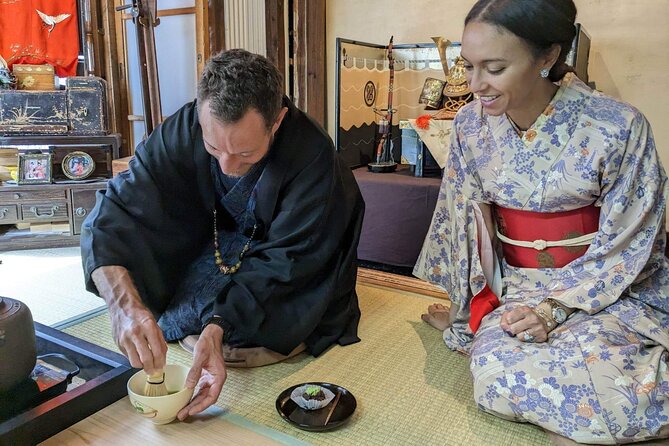
Upon booking, travelers receive confirmation, except in cases of last-minute bookings, and can expect a conveniently located experience near public transportation.
This unique antique kimono and tea ceremony experience is situated in a prime location, making it easily accessible for participants.
Although the venue isn’t wheelchair accessible, it’s stroller-friendly, allowing families with young children to participate.
Plus, service animals are permitted, ensuring that all guests can fully engage with the experience.
With its central location and convenient transportation options, guests can easily navigate to and from the venue, allowing them to focus on seeing the traditional Japanese culture.
Booking and Cancellation Details
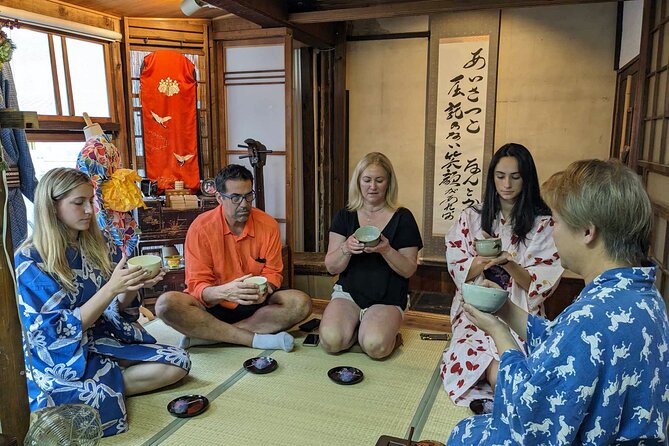
Travelers should be aware that infants are required to sit on laps, and pregnant travelers aren’t recommended to participate, with a maximum of six travelers allowed per tour or activity.
To ensure a smooth experience, it’s essential to understand the booking and cancellation policies.
Upon booking, travelers receive a confirmation, except for last-minute bookings.
Cancellations made 24 hours in advance are eligible for a full refund. However, no refunds are given for cancellations within 24 hours of the start time, and no changes are accepted within this timeframe.
Traveler Reviews and Ratings
Thirty-one reviewers have collectively given this antique kimono and tea ceremony experience a perfect 5.0 rating, with detailed feedback on Viator and TripAdvisor.
Travelers have shared their thoughts on various aspects of the experience, providing valuable insights for future participants.
The hosts have responded to many of these reviews, addressing concerns and expressing gratitude.
This open dialogue has fostered a sense of community and accountability.
The overwhelmingly positive feedback is a testament to the experience’s quality and value.
With such a strong reputation, it’s clear that this unique cultural encounter has left a lasting impact on its participants.
The hosts’ dedication to providing an exceptional experience is evident in the glowing reviews.
Atmosphere and Experience Highlights
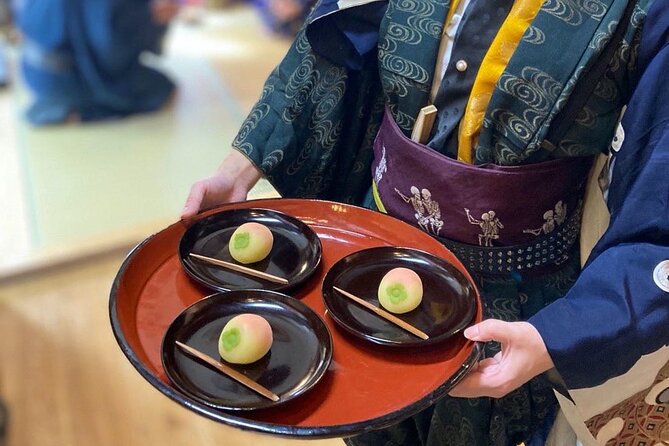
The warm and welcoming atmosphere created by the hosts sets the tone for a unique and educational experience.
Guests are made to feel comfortable and at ease as they choose and dress in traditional kimonos.
The informative and relaxing tea ceremony is a highlight of the experience, with the hosts providing explanations of the traditions and significance behind the ceremony.
This creates a sense of culture, allowing guests to fully appreciate the intricacies of Japanese customs.
The atmosphere is further enhanced by the hosts’ warm hospitality, making guests feel honored to be experiencing Japanese culture firsthand.
The Unique Kimono Experience
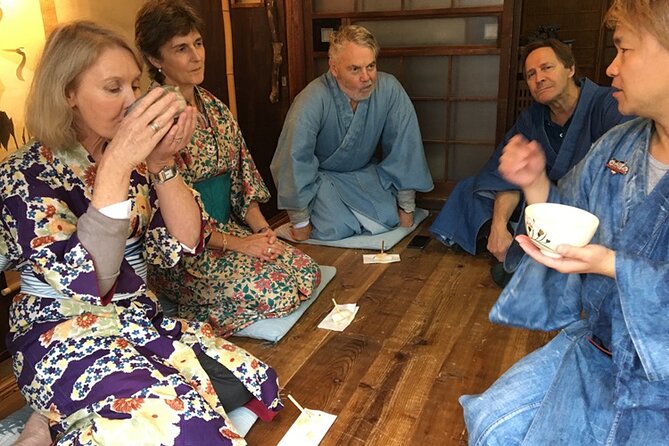
Guests are treated to a unique and immersive experience as they carefully select and don their chosen kimonos, an integral part of the traditional Japanese attire.
This hands-on encounter allows participants to explore the world of kimono culture, exploring the intricate designs, vibrant colors, and rich history behind these stunning garments.
With guidance from knowledgeable hosts, guests learn the art of properly wearing a kimono, discovering the significance of every fold and tie.
As they slip into their chosen kimonos, guests are transported to a bygone era, experiencing the elegance and refinement of Japan’s traditional fashion.
This unforgettable encounter is a testament to the beauty and craftsmanship of antique kimonos.
The Traditional Tea Ceremony
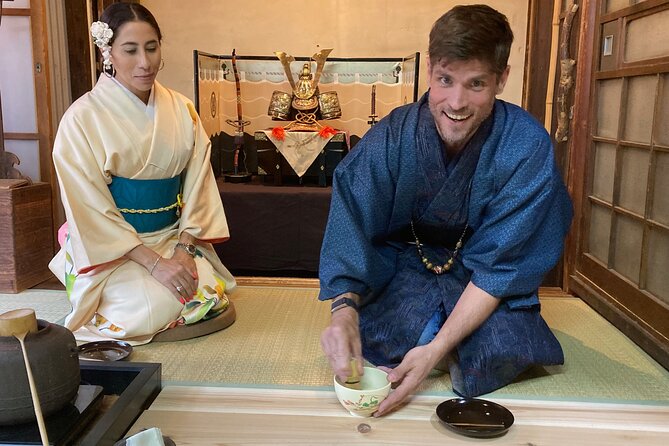
With delicate fingers, the host carefully whisks the matcha powder, releasing a subtle aroma that fills the serene atmosphere of the tea room, signaling the commencement of an authentic Japanese tea ceremony.
As guests settle in, the host explains the significance of each element, from the intricately designed ceramics to the carefully pruned bonsai trees.
The ceremony unfolds with precision, as the host skillfully prepares the matcha, pouring it into delicate cups with grace.
The air is filled with the sweet scent of incense, and the soft sound of traditional Japanese instruments creates a soothing ambiance.
As the ceremony concludes, guests depart with a deeper understanding of this ancient tradition, appreciative of the tranquil atmosphere and the opportunity to experience Japan’s rich cultural heritage.
Cultural Insights and Etiquette
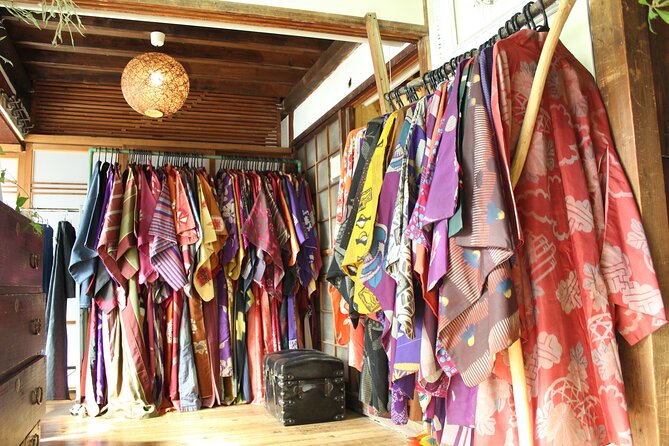
As the tea ceremony’s serene atmosphere lingers, attention turns to the intricacies of cultural etiquette, where subtle gestures and respectful demeanor play a vital role in honoring Japan’s rich heritage.
Guests learn about the significance of bowing, the proper way to handle traditional Japanese utensils, and the art of mindfulness during the ceremony.
The hosts provide insightful explanations, ensuring participants understand the cultural context and value behind each custom.
This unique experience allows visitors to delve deeper into the intricacies of Japanese culture, fostering a deeper appreciation for the country’s traditions.
Overall Experience and Takeaways
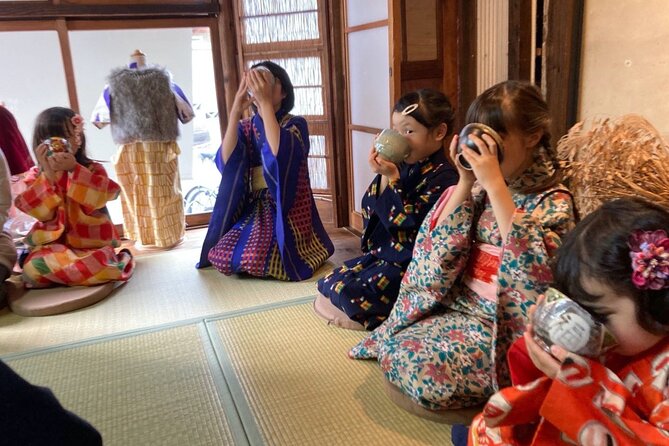
They leave the tea ceremony with a profound appreciation for Japanese culture, carrying with them valuable memories and a newfound understanding of the intricacies of traditional etiquette.
The experience is truly immersive, allowing guests to connect with the culture on a deeper level.
Key takeaways from this unique experience include:
- A deeper understanding of Japanese traditions and customs
- An appreciation for the intricacies of traditional etiquette
- A sense of connection to Japanese culture and its rich heritage
Guests depart with a newfound respect for the culture, feeling grateful for the opportunity to experience it firsthand.
The hosts’ expertise and warm hospitality make the experience truly unforgettable.
Here's a few more nearby tours and experiences we think you'll like.
Frequently Asked Questions
Are Food and Drinks Allowed During the Tea Ceremony?
During traditional Japanese tea ceremonies, food and drinks are not typically allowed, as the focus is on the ceremony itself. In this experience, it’s best to ask the hosts beforehand to confirm their specific policies on consumption during the ceremony.
Can I Take Photos During the Kimono Dressing and Tea Ceremony?
She can take photos during the kimono dressing, but politely refrains from doing so during the tea ceremony to respect the traditional atmosphere and focus on the experience, as requested by the hosts.
Are There Any Specific Dress Code Requirements for the Experience?
She doesn’t need to worry about a specific dress code, as guests will be dressing up in provided kimonos. However, it’s recommended to wear comfortable clothing and socks, as they’ll be removing their shoes during the experience.
Can I Purchase the Kimono or Tea Ceremony Items as Souvenirs?
She can inquire about purchasing kimonos or tea ceremony items as souvenirs, but it’s unclear if they’re available for sale; she should ask her hosts during the experience to clarify their souvenir policy.
Are There Any Opportunities to Ask Questions During the Experience?
During the experience, travelers can freely ask questions, and hosts actively encourage curiosity, providing thorough explanations of Japanese traditions and etiquette, ensuring a truly immersive and educational experience.
Not for you? Here's more of our most recent tour reviews happening neaby
- Maiko Happy Hour !
- A Taste of Kyoto: Private Tour
- Private Customized 3 Full Days Tour Package: Discover Kyoto, Arashiyama and Nara
- Kyotos Tea Meditation Zen Temple
- Shore Excursions KYOTO, OSAKA, NARA or KOBE (Max 9 Pax)
- Private Kimono Photography Session in Kyoto
- Private Japanese Cooking Class & Tofu Intro With Rita in Kyoto
- Ninja Explore Private Tour, E-Bike & Training Mt. Hike Near Kyoto
- Shirakawago and Takayama 2 Days Tour From Osaka or Kyoto
- Kyoto Millennium Shogun E-Bike Cycling Tour (East Course)
- Kyoto Arashiyama Sanzen In Temple Day Tour
- Private Airport Transfer Kansai Airport in Kyoto Using Hiace
- Hozugawa Rafting in Kyoto
- From Osaka 10 Hours Tour With Private Vehicle in Kyoto or Nara
- Private Lake Biwa Tour With Licensed Guide and Vehicle
Final Words
This unique antique kimono and tea ceremony experience offers an immersive and educational encounter with traditional Japanese customs.
With English-speaking hosts, participants can explore the nation’s rich heritage, donning exquisite antique kimonos and participating in a traditional tea ceremony.
This captivating experience provides a seamless and enjoyable journey into the essence of Japanese culture, leaving travelers with a deeper understanding and appreciation of the country’s customs and traditions.
